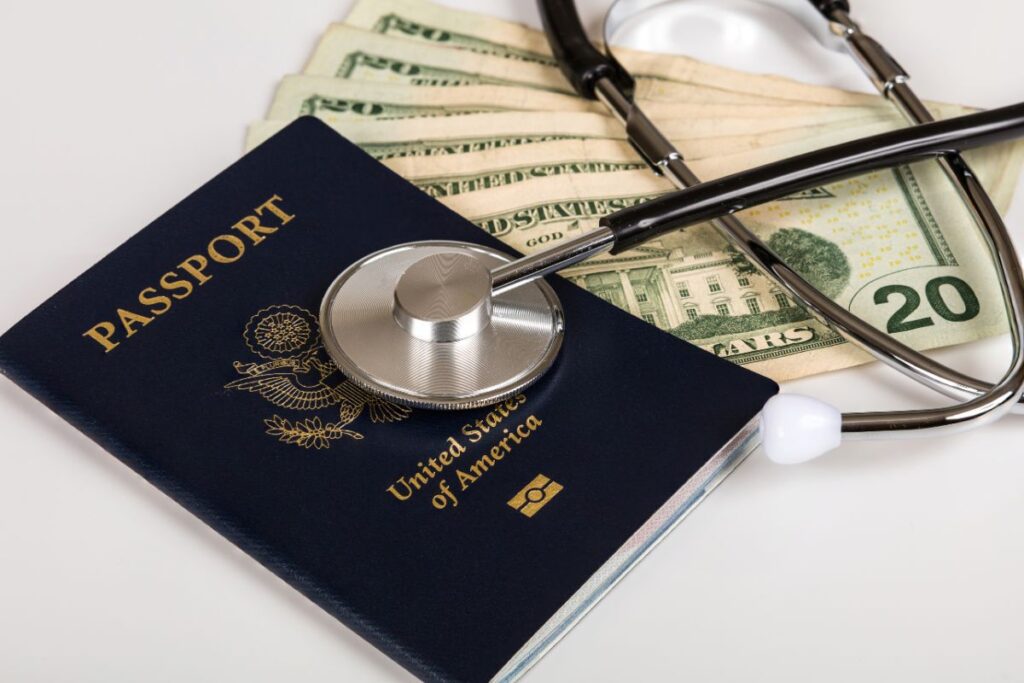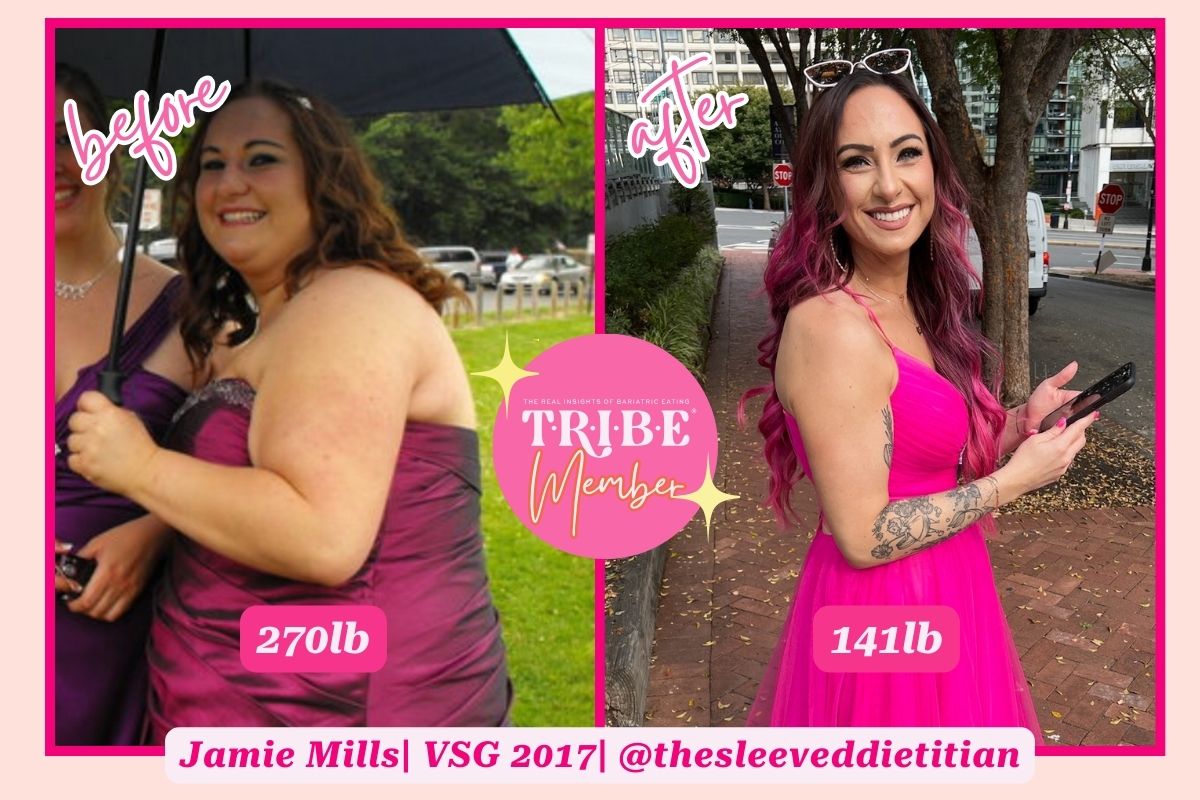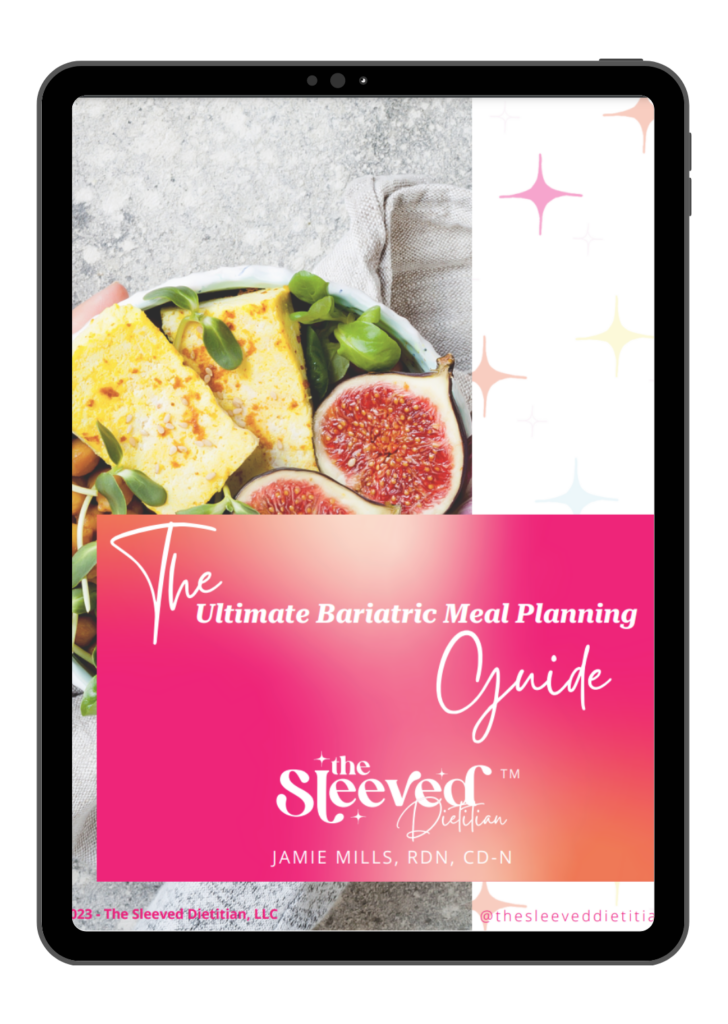If you’re in the beginning stages of starting your bariatric journey you’re probably wondering, how much is gastric sleeve? Cost is a huge factor and potentially a pretty big barrier to being able to have weight loss surgery.

Hi! I’m Jamie. I’m a registered dietitian who had the gastric sleeve back in 2017. I now specialize in supporting weight loss surgery patients on their journeys. It’s my mission to bring you the best support and resources for before and after surgery!
In today’s post we are going to go over how much it costs to have the gastric sleeve procedure. We’ll also go over some additional costs and considerations you may not have thought of. Let’s dive in!
What is the gastric sleeve procedure?
First things first – what is the gastric sleeve procedure? Gastric sleeve, formally known as the vertical sleeve gastrectomy (VSG), is one of the more common types of weight loss surgeries available.
How is it performed?
Most gastric sleeve surgeries are now done laparoscopically, meaning, it’s minimally invasive. During the gastric sleeve procedure, approximately 85% of the stomach is removed. The remaining portion of the stomach is shaped like a tube or a banana and resembles a “sleeve.”
The gastric sleeve surgery typically results in anywhere from 25-30% total weight loss. Not only does this procedure limit portion sizes and the amount of food you can eat, it also has metabolic benefits as well.
The portion of the stomach that is removed is called the “fundus” of the stomach. This is where the hormone “ghrelin” is produced. This is the hunger hormone. By removing this hormone, it lessens your hunger and desire for food. This hormone does begin to be produced again over time, but the metabolic benefits are still long lasting.
Why is the surgery so popular?
The gastric sleeve procedure is one of the more “ideal” weight loss surgery procedures because not only does it result in significant weight loss for those struggling with morbid obesity, it’s minimally invasive, and there is no malabsorption, so your risk for nutrient deficiencies is much less.
To learn more about how to avoid nutrient deficiencies after weight loss surgery read this article that covers everything you need to know about vitamins after weight loss surgery.
How much does the gastric sleeve cost in the US?
As with any medical procedure, the cost plays a big role in your decision making. Affordability and accessibility are still a huge barrier to gaining access to proper obesity care. On average, the gastric sleeve procedure in the US without insurance is approximately $13,000 but can be as much as $20,900 or more.
In the US, everyone’s healthcare situation is going to be different. So while those are typically the baseline costs of the procedure, using insurance may be an option. Let’s take a look at some of the scenarios.
With commercial or private health insurance coverage
Commercial insurance is typically the type of insurance employers provide to their employees, so in other words, the type of health coverage you typically get offered in your benefits package from work.
Private health insurance is an individually purchased health coverage plan. These plans are similar to the types of plans that companies typically offer, except the financial responsibility is 100% on the individual.
When it comes to having insurance coverage for weight loss surgery, whether that be through your employer or a private plan, the cost is going to vary greatly depending on the type of plan you have, how much your monthly premium is, and what your yearly deductible looks like.
But typically, if you meet the criteria for being clinically diagnosed with obesity and/or you have obesity related comorbidities ( AKA other diseases in relation to your weight), so long as your insurance plan doesn’t exclude weight loss surgery procedures, a portion, if not all of the costs may be covered. The first step is to call your insurance and see if gastric sleeve surgery is covered.
Insurance coverage criteria
In order to qualify for insurance coverage for gastric sleeve there are certain criteria that need to be met. Some of these qualifications include:
- Documented history of weight loss attempt/proof that you have been unsuccessful with weight loss through diet and exercise alone in the past.
- BMI of 35 or greater WITHOUT comorbidities
- BMI of 30 or greater WITH comorbidities
Some comorbidities that may qualify you for weight loss surgery coverage include:
- Sleep apnea
- Type 2 Diabetes
- Heart disease
- High blood pressure
- High cholesterol
- Non-alcoholic fatty liver disease
Now, in order for your insurance to consider paying for all or a portion of your gastric sleeve, they usually have a “to-do list” that needs to be fulfilled before they will officially approve you for surgery.
This varies as well, but most insurance companies have a 3-6 month waiting period for insurance coverage to not only make sure you are ready to make the lifestyle changes necessary to be successful with life post-sleeve, but to ensure your safety before undergoing the procedure.

Some of these additional check-list qualifications may include:
- Attending an information seminar at your desired bariatric center
- Meeting with a bariatric surgeon for a consult
- A 3-6 month waiting period where you typically will have to:
- Get clearance from your PCP
- Extensive blood work
- EKG/cardiology clearance
- Sleep study
- Psych evaluation
- Pulmonology clearance
- An endoscopy
- 3-6 months of a medically supervised diet that includes meeting with a registered dietitian on a monthly basis
Additional tests may be required as well. Once you’ve been cleared and able to prove you are eligible for surgery, then typically all documentation is sent to your insurance who will then decide whether or not they are going to pay for all or a portion of your surgery.
If you are denied coverage you may be able to file an appeal with the support of your surgeon/surgery center.
Does Medicare/Medicaid cover gastric sleeve surgery?
Typically the answer to this is yes. However, that’s pending similar or the same above criteria being met. Medicare/Medicaid coverage also may vary by state.
Financing options for gastric sleeve
The good news is that even if your insurance doesn’t fully cover the gastric sleeve or it doesn’t cover it at all there may be financing options available.
One of the more popular financing options in the US is care credit. Care credit is essentially a credit card that can be used for medical procedures and/or medical costs. You may qualify for care credit and this credit card option will likely be able to cover some or all of your out of pocket expenses related to gastric surgery.
If care credit isn’t an option, you may potentially qualify for a small personal loan. You likely would need to check with local banks or credit unions and your options will usually depend on your income, current debt to income ratio, expenses, and credit score.
Medical tourism

What is medical tourism? Medical tourism is when people travel to another country to receive medical care at a cheaper rate than the US typically can offer.
Now, I already know many of you are shuddering at the thought. And if you’re a bariatric professional who treats weight loss surgery patients, you may even be upset with me for even mentioning this option.
Before I dive in a bit more let me be clear, in no way am I recommending this option or telling you that this is the best option for you. I just want you to be aware that it is in fact an option, and should it be one you explore, I want you to know the ins and outs of it.
Potential benefits of medical tourism
- Less expensive: One of the main and most obvious benefits of going the medical tourism route is that it is likely going to be less expensive if you are self-pay than it would be in the US. Having gastric sleeve surgery in Mexico, which is one of the most common locations for having gastric sleeve abroad, typically ranges from $4,500 – $6,000 on average.
- All-inclusive: Usually this cost includes any pre-op clearance tests such as blood work, EKG, etc. Your stay is usually included as well.
- No pre-op waiting time: Now this could also be a negative factor depending on how you look at it. Having the pre-op waiting period in place is for your benefit to make sure you are a good candidate for surgery. However, for some people, not having to wait as long could be a benefit.
Potential downfalls of medical tourism
- Safety: You need to ensure you are going through a reputable surgical center and you need to make sure where you’re traveling to is safe. Most of these surgical centers a run by US board-certified surgeons who choose to practice in other countries. HOWEVER, That is not always the case! Doing your research is incredibly important.
- No nutrition guidance: Most people who choose this route have very little nutrition guidance both pre and post-op. This could lead to complications and could also significantly impact how much weight you lose as a result.
- Travel: Not only will the cost of travel be a factor, but your safety and comfort when traveling. Most surgical facilities outside the US only keep you there for 4-10 days. Traveling, especially flying, too soon post-op could lead to complications and may make healing and staying hydrated (the #1 reason for bariatric hospital readmittance) more likely.
- Follow up care: If you choose to have surgery in another country, you need to consider that you won’t have any follow up care by the team who performed your surgery. It is your responsibility to set up appropriate post-op care here in the US, which can be very challenging, as many US physicians and surgeons won’t be willing to take you on as a patient if you choose medical tourism. This could especially be a problem should you develop any complications.
Additional costs associated with getting the gastric sleeve
Aside from the actual surgery itself, there are other costs that are indirectly associated with the cost of the gastric sleeve. You aren’t just paying for your surgery, you’re investing in your health long-term, which will also come at a cost.
Costs related to medical care
As already mentioned, getting insurance approval can be a tricky and lengthy process depending on your insurance plan.
In addition to the cost of the actual surgery here are some other costs to factor in:
- Out of pocket costs for hitting your out of pocket max/deductible for the year
- Co-pays for pre-op related appointments
- Co-pays for post-op related appointments (which, depending on when in the year you have your surgery, your post-op appointments may run into the next year which would impact your deductible)
- Hospital stay
- Anesthesia
- Dietitian and specialist appointments (if not covered by your insurance).
Personally, although I was fortunate enough to have insurance that paid for 100% of my surgery, I had a ton of out of pocket expenses that I wasn’t expecting. As a struggling college student at the time, this was particularly difficult.
An example of this was my dietitian appointments. My insurance required me to attend six appointments with a dietitian (despite being one myself) in order to meet their requirements. But come to find out, per my plan, they only would cover three dietitian visits for the year. For each additional visit, I was billed $250, which came to $750 total just for those remaining appointments.
Costs related to things you will need on your gastric sleeve journey
If you’re looking into having a gastric sleeve, some of these medical costs might be something you’ve already thought of. But what you may not have thought of is the cost of other necessities you will likely need on your weight loss journey.
- Bariatric vitamins: bariatric vitamins are required for life, which means you will need to be able to purchase them on a monthly basis.
- Protein powders/ shakes: most gastric sleeve patients are dependent on protein supplements for the first few months after surgery. While you might not need them long-term, many bariatric patients prefer keeping them in their routine.
- Bariatric snacks: while this isn’t an absolute necessity, many bariatric patients like to purchase high protein lower sugar snack options such as Quest Protein Chips or Built Protein bars.
- Therapy appointments: while not a requirement, I suggest all bariatric patients seek out therapy on this journey to support their mental health.
- Gym membership: also not a requirement. It’s totally possible to get exercise or movement into your routine without a membership, but many people find belonging to a gym makes it “easier.”
- Clothes: shopping after weight loss surgery can be so fun! It’s a whole new world getting to buy smaller clothes. This can quickly add up though when you are frequently going through sizes as you lose weight.
- Support: investing in support and accountability can be a huge factor in your outcomes and success. There are some free support groups available, likely through your surgery center, but many patients choose to invest in their own support options.
Thinking about getting the gastric sleeve?
If you’re reading this there’s a good chance you’re exploring your options to have weight loss surgery. The main takeaway I want you to walk away from this blog is that although surgery is an investment in more ways than one, getting approved for surgery is possible and there are many ways to make it happen!
Choosing to invest in yourself is a HUGE first step and I’m really proud of you for considering having surgery to change your life. When you choose to invest in yourself and your journey you are choosing you and your goals and I want you to know you are worthy and deserving of hitting all your weight loss milestones.
With any bariatric surgical procedure, in order to fully reap the benefits and get the most out it, you need to be willing and able to change your habits for the long run. And as I already mentioned, getting support and accountability on this journey is huge.
If you’re thinking of having surgery I urge you to start choosing you NOW, not later. The one thing I regret on my journey it’s not getting the support on this process I needed sooner.
If you’re looking for more support on your surgical weight loss journey I want to personally invite you to join us in the T.R.I.B.E. Membership!
T.R.I.B.E. is my signature membership program that has supported thousands of bariatric patients over the years in hitting their weight loss goals. In this program, we have monthly pre-op support groups where we can guide and support you through this overwhelming pre-surgical process.
I hope to see you there! If you have any questions please drop them below! I’m always here to answer questions and support you.
Until next time,










2 Responses
I ran across this website looking for ideas to lose weight and keep it off. I found the 10 day sample menu plan and tried it for two days. I really liked it. I made some substitutes but it really seems like this is what I’ve been looking for. I later read what gastric sleeve was and I believe as long as I follow the recipes I won’t have to have the surgery. I was pre-diabetic 3 months ago. I changed my diet and began exercising. When I went back to the doctor she said I was no longer prediabetic. It was really hard trying to maintain that eating habit. However, your menu plan looks feasible. I can still eat good and not gain that weight. The combinations of foods and snacks have been very helpful. I actually got back on the website looking for a cookbook. I can eat what I want and still lose weight? I’m all in.
Thank you so much! I’m so glad you have found it helpful! I don’t have a cook book, but I did publish a book called “The Easy Way Out: Why Bariatrics Isn’t Cheating Obesity, It’s Treating It.” In that book I talk more about my approach to nutrition and share more about how obesity is a disease and the best ways to overcome it. xoxo